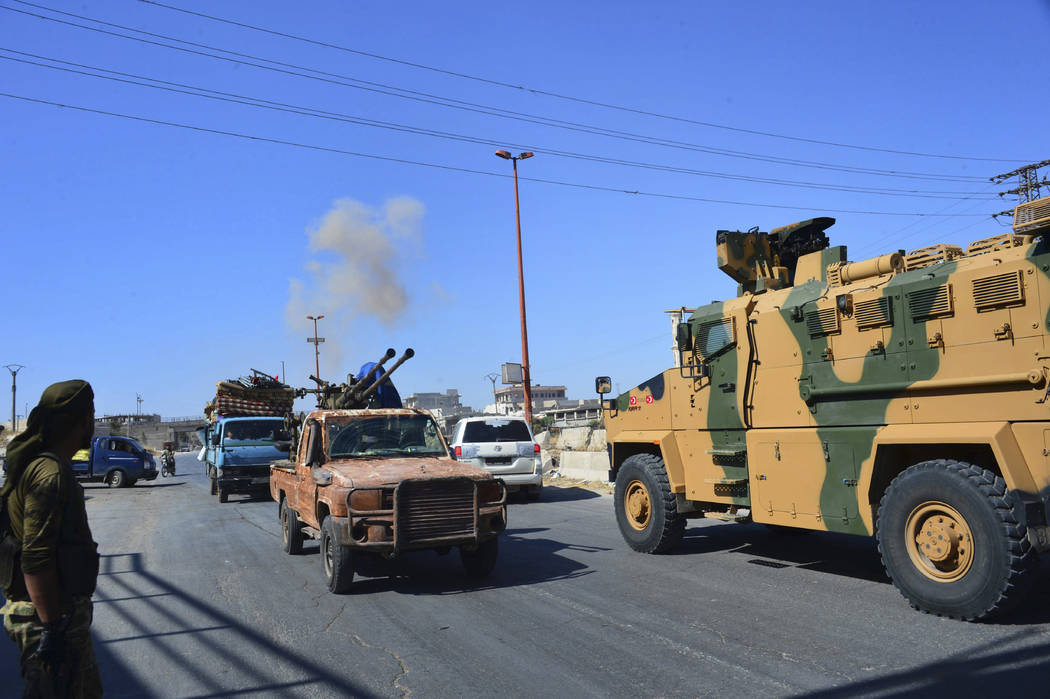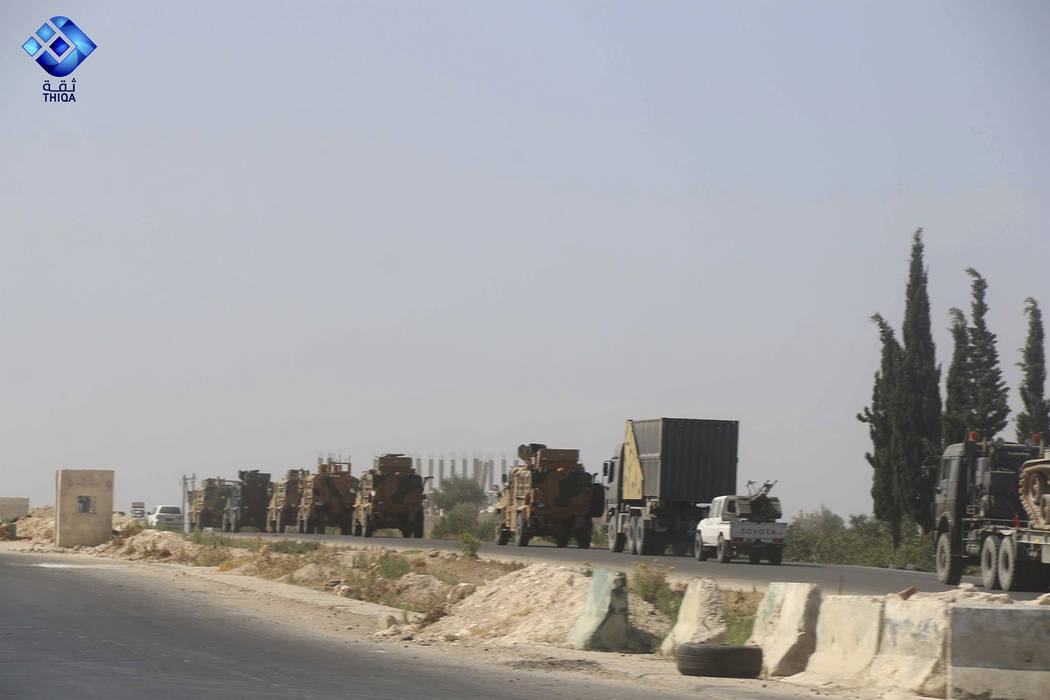3 killed after airstrikes target Turkish convoy in Syria
DAMASCUS, Syria — Airstrikes targeted a Turkish army convoy inside a rebel-held part of northwestern Syria on Monday, killing three civilians and wounding 12 others, the Turkish Defense Ministry said.
Syria said the Turkish convoy was carrying ammunition to rebels who have lost ground this month amid a government offensive to retake their last stronghold in the country.
The incident ratcheted up tensions in the region, currently ground zero in the long-running Syrian civil war that has put Turkish, Russian, U.S. and Iranian interests at stake.
The Turkish Defense Ministry said the convoy was attacked while heading to one of Turkey’s observation posts in rebel-controlled Idlib province, but did not say whether any Turkish people were killed.
Syria’s Foreign Ministry said the convoy of armored vehicles was delivering weapons to Khan Sheikhoun, a major rebel-held town that lies on the front line of fighting along the southern edge of the Idlib enclave. The town is a stronghold of al-Qaida-linked Hayat Tahrir al-Sham, the most powerful militant group in the area.
It was not immediately clear whether the airstrikes were carried out by Syrian or Russian warplanes. The convoy consisted of several armored vehicles and flatbed trucks carrying tanks.
The Turkish move into Idlib appears to be a message by Ankara that it won’t allow Syrian forces to capture Khan Sheikhoun, which would cut the highway linking Idlib to northern parts of Hama province, home to one of Turkey’s observation posts.
Syrian government forces reached the town’s outskirts earlier Monday.
The Syrian Observatory for Human Rights, a war monitor, and Idlib-based opposition activist Mazen al-Shami reported that Syrian troops reached the M5 highway north of Khan Sheikhoun. That would make it more difficult for rebels and civilians to move between Idlib and rebel-held areas in northern parts of Hama province.
Just before midnight, the Observatory and other activists reported that Syrian troops entered Khan Sheikhoun from the northern part after the insurgents retreated amid intense clashes and heavy airstrikes. The town, one of the largest in Idlib province, has been emptied of residents who fled the violence.
The town came under a suspected chemical attack on April 4, 2017 that killed 89 people and triggered the first direct American assault on the Syrian government.
The United Nations called for de-escalation and a return to the cease fire negotiated in September, sponsored by Russia, which backs the Syrian government, and Turkey which backs the rebels, who have controlled the region since 2012.
Under that deal, the M5 highway was supposed to be open by the end of 2018 but that never happened. Now, Syrian troops appear to be trying to open it by force.
The Turkish Defense Ministry’s brief statement did not provide details but “strongly condemned” the airstrikes, adding that they were “against existing agreements as well as our cooperation and dialogue” with Russia.
The strikes hit near the highway where the convoy was traveling, Syrian activists said.
Turkey’s private DHA news agency said Syrian government planes targeted the route of a Turkish military convoy carrying reinforcement vehicles and personnel. It said the convoy was heading toward two Turkish observation posts when it came under Syrian aircraft fire.
The report said the convoy could not proceed because the route between Maaret al-Numan and Khan Sheikhoun was targeted. The agency did not report any casualties.
The Britain-based Observatory said airstrikes believed to be from Russian planes struck near the highway and forced the nearly 25-vehicle Turkish convoy to stop.
Al-Shami also said that warplanes struck areas near where the Turkish convoy was moving. The Sham Network, an activist collective, posted photos of the Turkish convoy. A mushroom cloud of smoke, apparently from the airstrike, could be seen in the distance.
Among those killed was Mohammed Hussein al-Qassem, a commander with the Failaq al-Sham rebel group that is supported by Turkey, opposition activists said.
Hours after the airstrike, the Turkish convoy was just north of the village of Heesh in Idlib, said Yazan Mohammed, a media activist in Idlib province.
The Observatory’s chief, Rami Abdurrahman, said Turkish aircraft were over the area where the convoy had stopped, adding that another convoy was also heading to the area from northern Idlib province.
The Syrian Foreign Ministry called the convoy’s incursion a “flagrant Turkish intervention,” saying that “this hostile behavior of the Turkish regime” wouldn’t affect Syria’s push into Khan Sheikhoun.
Syrian troops have been on the offensive in Idlib and its surroundings since April 30. The region is home to 3 million people, many of them displaced by other battles around the war-torn country. The latest round of fighting in the past month has displaced some 450,000 people.
Fraser reported from Ankara, Turkey. Associated Press writer Bassem Mroue in Beirut contributed.




















